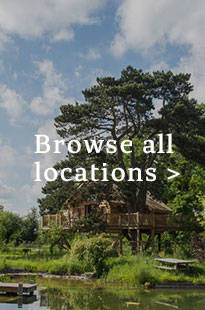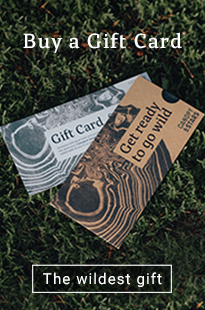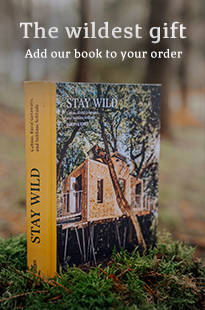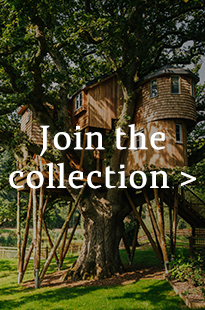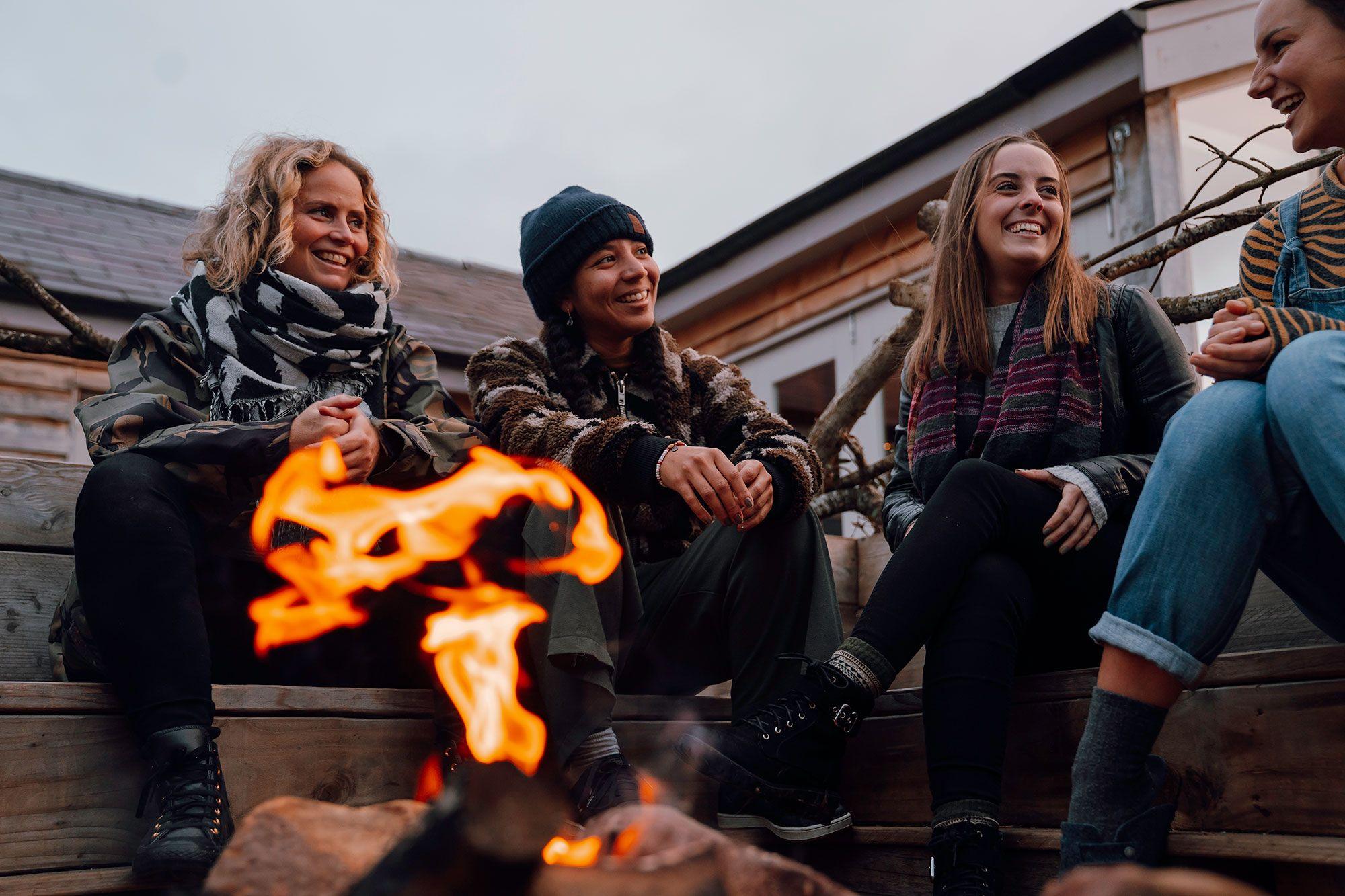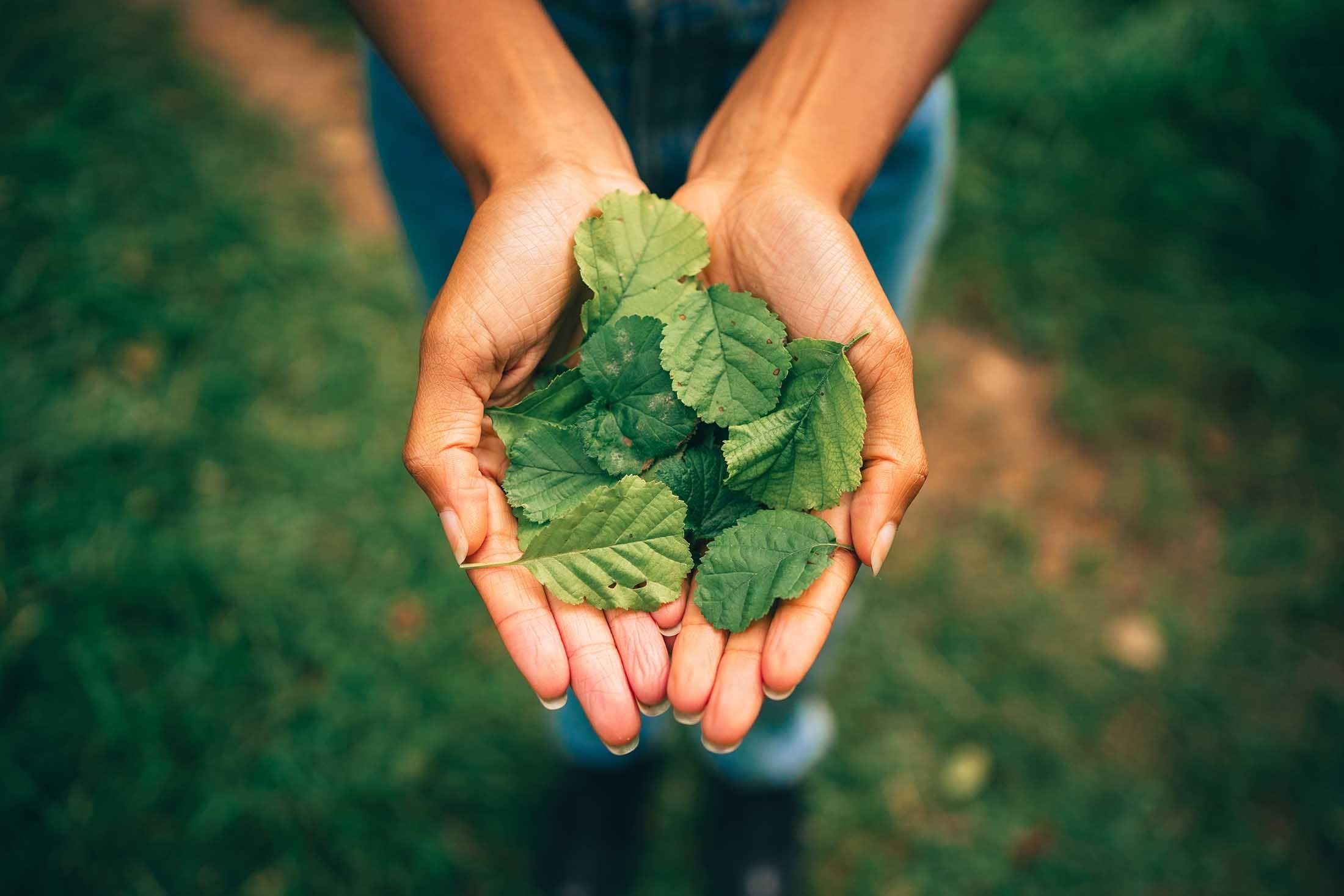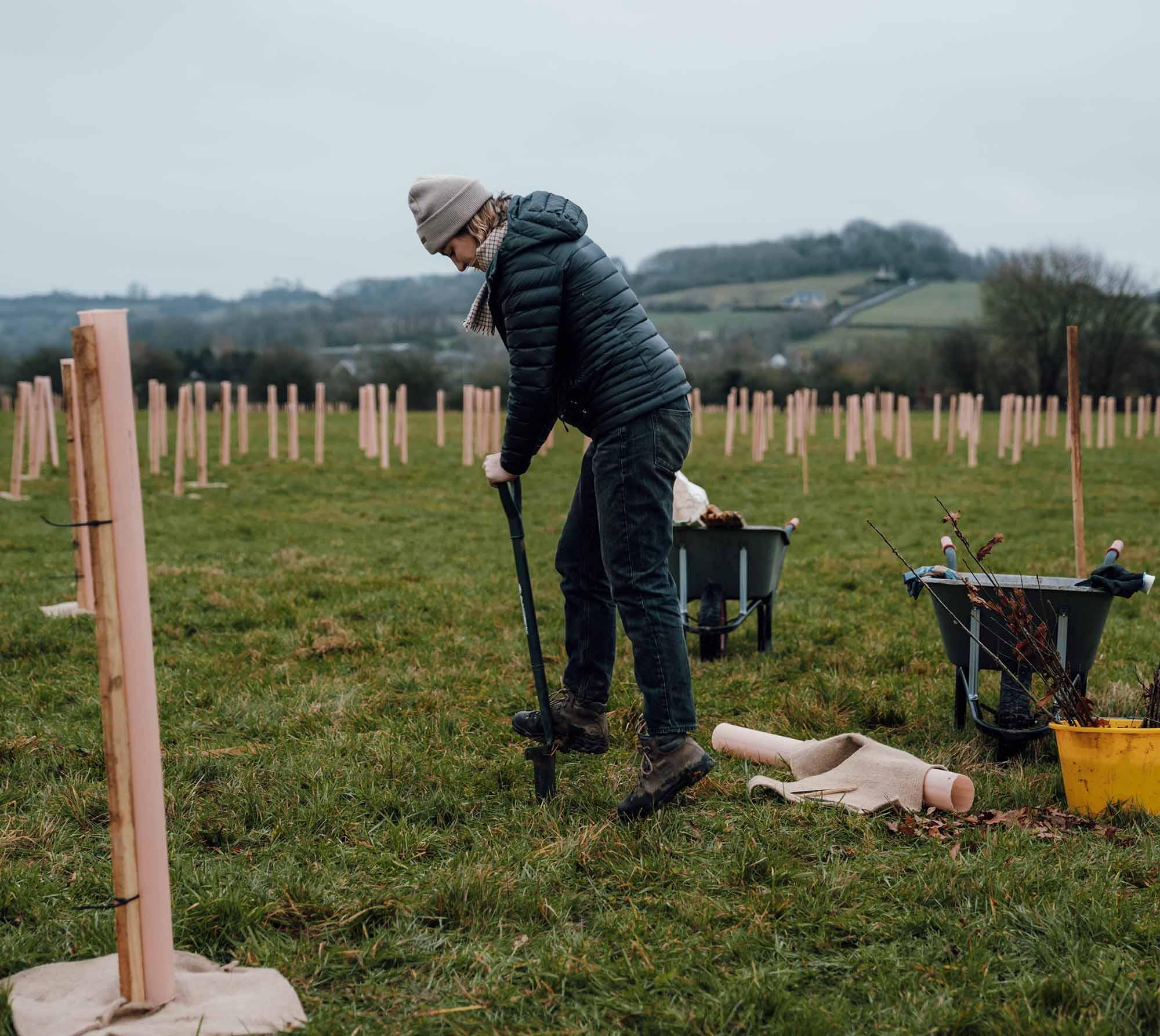- Location
- Glamping
Special occasions
- Stories
- Gift Cards
- About us
About Canopy & Stars
More from Canopy & Stars
More at Sawday's
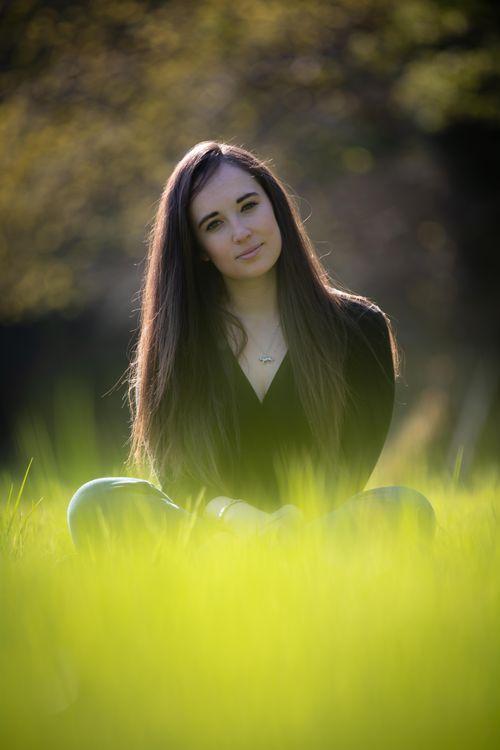
A Life More Wild - Episode 6
Megan McCubbin & Swallowtail Hill
Amazing wildlife in your garden, with zoologist and presenter Megan McCubbin
Megan McCubbin, known for her appearances on Springwatch, takes us on a walk through the New Forest garden where the enormously successful Self-Isolating Bird Club was founded. She tells us about spotting an otter's dinner, the hearts in a butterfly's wings and growing up with barn owls in the bathroom.
So we're here in the garden where you started the Self-Isolating Bird Club. Did it help you cope as much as it did other people?
Every time you step out your front door is a different experience. You can go outside 100 times in the same location, but you'll never see the same thing twice. And I think if there was ever a silver lining to come from the absolute tragedy and horrific year that we've all been through, it was the fact that we have reconnected with the environment around us. It's not the brightest of days, there's quite a lot of cloud cover, quite a bit of rain. But the birds are still singing their little hearts out. And it's a beautiful place.
What lives here?
There are lots of different habitats here, so it supports a whole breadth of different biodiversity. It's just filled with life. One of my favourite things about this location is the fact that there's a breeding Tawny owl pair. They've become my absolute obsession over the last couple months. They found their nest box and we watched the adults go in. And when the female disappears, you know that she is sitting on eggs. The male was coming in at the same time every night and I was having to sit quite quietly because he's relatively timid. But he was coming in to provision her with mice and all the other food that he was finding out and about. So I've been watching them grow every kind of day or so.
Watching and listening?
Yeah it's always fun because you can often hear the male call first at night, and then you know which direction he's coming in from. And then the female replies and you get that "twit twoo" sound and it's actually the male and female duetting. So what happens is the female goes "twit" and then the male goes, woo. I always remember it by thinking that the male is trying to woo the female. So it's a beautiful kind of iconic thing between two individuals.
What stage are the owls at?
The female has been pushed out of the nest, because the chicks are so big. So any day now, there should be some very fluffy, very adorable Tawny chicks. They're one of my favourite bird species and when I go to bed and I lay my head down I always listen out for my Tawny owls and it really kind of calms me down.
Where are we heading now?
So one of my favourite spaces just to sit and watch is the local river which we can head over to. It brings in so many different types of life that otherwise just wouldn't be here. There's been a lot of rain recently, so the waterline has massively gone up. It's overflowing. It's really really big, but you know, it's good. We needed a bit of rainwater, so hopefully, it will kind of encourage some more biodiversity.
What do you look for here?
So one of my favourite river visitors at the moment, I haven't actually got visual confirmation of yet but there is evidence! So... I've got two dogs called Sid and Nancy and they've got the finest noses to sniff out absolutely anything and everything. And Sid came back one day very proud of himself because he'd found half an eel that he'd picked up from quite close to the river. And looking at this eel, I thought Sid definitely hadn't caught an eel and eaten half of it, but we think an otter probably caught it, because of the teeth marks in the flesh.
And the otters are a good sign?
It was the most exciting thing, because if otters are in this river, you know, they've really kind of bounced back from facing extinction in the UK. They are now in every county, we believe. And that's really important. They're an indicator species, so we know that if we have otters, an apex predator, then ultimately, our freshwater ecosystems are healthy. And that's what we really do need. And I hope to see a lot more of them, but I might have to lay out some trail cameras to confirm an otter's presence. Until then, it's speculation, but that's part of the fun of wildlife. You don't always have to see it, to be excited by it. You don't always have to visually get a glimpse, you know, you can know what's around by looking in the mud.
So was time outside enough to get you through lockdown?
It's always recommended that you should spend at least two hours of your time outdoors per week to increase your mental health. And it's actually less about the amount of time you spend outside and more about something called nature connectedness. There's lots of science at the moment, which is really exciting and I always say to people, you can go outside and you can listen, but you might not hear. You could go outside and you can see, but you might not be watching. So I always say you know, stop in your tracks. Walking is great. Of course it helps our physical health, but stop and really engage with what's around you.
What are we hearing right now?
The blackbirds are going crazy. And you can hear a robin over this way, a sparrow's just landed over there. And if I'd continued talking throughout that period of time, that wouldn't be a song, or a sight that I was really hearing or seeing because I would have missed it. So it's really important that we connect with exactly what is in our own landscape, by just staying still. That's really important. It's something that I've tried doing throughout the course of my life, I suppose.
And your life has always had animals in it, quite literally, right?
So I met my stepdad Chris Packham when I was two years old. And at that point, he was presenting the Really Wild Show and always travelling around the world filming wonderful wildlife in the most amazing places with the most amazing people. And when I met him, it just opened my eyes to that wildlife. I was very fortunate that whenever there was a job where he could take me, then I was there with him. So I think my love for wildlife kind of stemmed from that.
But he also brought his work home with him?
My house when I was younger, was, you know, very odd probably by most people's terms. Our downstairs bathroom was this kind of rehabilitation room. So I'd get in from school, open the door, and there'd be a barn owl sitting on the toilet, or I'd go up to my bedroom and there'd be a new addition to the wildlife that I had in my bedroom.
So you had quite a menagarie...
I had praying mantises, I had a tortoise, I had cockroaches, but I had all the cutesy fluffy stuff as well. You know, I had the rabbits and the gerbils and the guinea pigs and the poodles. But I also had the more unusual species you could say. So wildlife was in the house, it was outside of the house, it was everywhere we went and it kind of just ignited this lifelong passion.
Do you think most people have that connection?
Young people always have that passion and that interest, it's just about maintaining it. It's about harbouring that connection and fostering it along the way. Oh! Male orange tip butterfly here, landing on some lavender.
It's hovering from flower to flower - looking indecisive!
Most bees and butterflies have the most amazing sense, where they're able to essentially feel before they land on the flowers. They can sense exactly how much pollen is in there, so they won't waste their energy on something that's not full of pollen, which is why you see them hovering and moving around. One of my favourite stories has to be the fact that Hairstreak butterflies have something called wing hearts in their wings.
Did you say "hearts in their wings"?
This is something which utterly blew my mind. For a long time, we used to think that the wings were lifeless structures, but that is far from the case. So what actually happens is, butterfly wing structure are living tissue and they've got so much going on in this tiny, really thin, beautiful wing. Hemolymph, which is the equivalent of blood for insects, is pumped round for thermoregulation. So essentially, they've got hearts in their wings pumping around this fluid to keep their temperature stable so that they don't dry out and so that they don't get too hot or cold. What an amazing thing. And every so often you know, something like this is discovered and I'm just jumping up and down. Because what a thing - butterflies have hearts in their wings! I mean, come on, doesn't get much better than that does it?
We're leaving the garden, where to now?
We're going into the actual reserves of the New Forest. There's lots of ponies here grazing away. We're walking around the edge of the field and going to a really special site, that we can't delve too far into because there's a very sensitive bird there, nesting curlews. So we have to keep kind of far away, but it's still nice to go and stand on the edge. And it just is common sense really isn't it? If you have a species which is in decline, then try and give it as much space as feasibly possible.
Is that something you find difficult to balance - conservation and appreciation?
It's so important that we engage in the beauty of nature and learn to love it for what it is. But it's equally as important that we talk about those difficult issues, you know, that we talk about the declines. For example, the nightingale has declined more than 90% in the last 50 years. We have to enjoy its beauty and fall in love with it through that, but we can't ignore the scary and hard hitting facts. I always say ignorance is no longer bliss, because we can't turn our backs on it anymore.
That's a tougher message than "look at the cute tawny owls" though...
Yes, it's hard. It's not always easy hearing about decline after decline, bad policy after bad policy. And there's two ways you can react to that. You can let it get you down. And when that happens, it's really hard to pull yourself up, trust me. But then there's option number two. So when I see something that really upsets me, or something which I think is just so unbelievably wrong, I think to myself, okay, yes, that is really bad. But what can I do tomorrow that's different from today to make a change? Can I wake up in the morning and help a campaign? Can I walk instead of drive? Can I have a plant based meal? Those individual actions make such a difference.
Do you get a lot of resistance to those ideas?
You know, a lot of people say to me, "I'm just one person, it doesn't matter what I do." And I think that's the most damaging mindset that anybody could have. Because actually, you know, it's only ever been one person that's made a difference. Look at Greta Thunberg, for example. She's a young Swedish girl that sat outside her school, to demand for better climate action. I look at the movement that she started. She's just one person, and she's caused a tidal wave. We can all do something different tomorrow than we did today. You know, those small steps might be small, but they're all equally as important and you are contributing to something really big by doing that, because if every person had that same attitude to wake up tomorrow and do something differently, the world would be such a brighter place.
The steep learning curve of going from city to country with Sarah from Swallowtail Hill
Sarah Broadbent, owner of Swallowtail Hill, left a life in corporate London behind and took up farming. She tells us about going from "this chicken's a funny colour" to expert conservationist and how she's always learning, even after thirty years.
So whereabouts are you exactly?
Okay, so Swallowtail Hill is right in the bottom corner of England. We are six miles outside of Rye in East Sussex, on 40 acres of privately owned nature reserve.
How did you end up there?
My husband Christopher began the conservation project at Swallowtail Hill 30 years ago. At the time, it was a little farmhouse with a bit of back garden. It was his start point for understanding and learning about conservation. As he learned more about conservation and started wanting to put his stamp on this little part of the countryside, it quickly became something bigger than he could imagine.
So it grew quickly?
As bits of farmland in the area that were adjacent to the cottage became available, he patched them on and eventually established us as a 40 acre reserve. It covers grassland, meadowland, wet meadow and coppice woodland. I came on the scene a little later on.
Was it quite a move from London?
Prior to that I was a city dweller, but we were at that kind of transition point of not really wanting to live in the city anymore. Our hearts were in the country, we spent every weekend here, we spent every holiday here and we upped sticks. It took two years to talk ourselves into it, because it seemed like a really scary big deal at the time.
Was it hard to let go of the city?
I think when you are rooted in what it means to be kind of an urban dweller, you're scared you think you're going to miss all of these things but actually we never missed any of them. All the things that we were worried about, even in the darkest winter, there's absolutely no regrets. I thought things like, "will we miss friends? Will they drift away from us?" The opposite has happened because we've become a place that friends want to come and visit. And that was really why the glamping came about because we realised that so many of our friends were wanting to come and stay in this wonderful place and enjoy what we created. We thought, Well, if they do, then there must be more people that want that too.
So the spaces were to allow people to share the feel of the place?
We created something here that afforded that space, that pause in time for people who perhaps don't have back gardens of their own or are mostly living in built up environment and don't access the big outdoors very often. It suddenly became a thing and we realised that we could be part of that and in doing so it would also secure the future of the farm and the conservation work that we do at the same time.
And you see its effect on people?
You see people who come out and are just blown away and changed by it. Totally. It's the families that come away, the children. I can think of a family just recently, a young girl, she was probably eight or nine. She wanted to encourage her family to have a day without electricity every week, which I think her mom was a little bit alarmed at the thought of. But you know, if we've instilled that kind of message in the next generation, that they understand the importance of looking after the planet, then terrific. I'm all for that for sure.
How did you pick up all the farming knowledge?
I think I think what has always helped me is that I've never been afraid of looking like a complete idiot and asking stupid questions. So if I think back to the beginning with our first animals on the farm, I had no shame about taking a slightly off-colour chicken with me to the vet and saying, "Look at this. Help me please!" And they'd be rolling their eyes and thinking "it's this daft woman from London again, who has no idea about the countryside." But you learn you and learn and thank goodness for the internet!
And you drew on the community too?
We have really embraced the local knowledge. I think that's the other thing that has been really important to us in our experience. When we moved down full time, we never came with that mindset of "this is how we do things because this is what we read about in London". We did a lot of talking to local people. We did a lot of listening to people and understanding how things have been done in the area for generations.
So what's the animal count up to now?
At the moment, we've got two donkeys, we've got one pig, Sue, who's a sweetheart. She's out sunbathing in her field at the moment. We've got some pygmy goats. We've got our chickens Of course. And our Idiot family dogs and some sheep, of course, who are a really important part of our wildflower grazing process. Without them, we couldn't do what we do.
How does that work then? Don't the sheep eat everything?
No! To traditionally raise a wildflower meadow, you need it grazed. And you need it grazed by an animal who isn't going to fertilise the ground too heavily. So a cow's no good because there'll be too much rich fertiliser going on to the soil and wildflowers need some fertiliser, but not too much. And you also need a creature who is light footed enough not to poach the ground too much. So if you had horses on it, or again, cows, they're too heavy and too large footed and you'd end up with too much churn for the meadows to do their thing. So we have a flock of sheep of our own. And then over winter when the grazing is really important in terms of reestablishing the meadow for the next year, we also have "keep sheep", other people's sheep which come and graze our land. And they do exactly as we need - graze down the grass and let the plants and seeds pass through their system and out the other end. And they trade it back in nicely with the light touch needed to fertilise the ground and re-sow the seed for us. So it is a perfect cycle of reestablishing the meadow every year.
With so much going on, do you have to keep a rigorous schedule?
My day usually begins at six. There's a round of feeding animals, mucking out animals, filling buckets with water. And to be honest this time of year [mid summer], that's a pleasure, because today, for example, is a beautiful blue sky of amazing birdsong here on the farm so that's my soundtrack when I'm outside feeding the animals. The birds follow me around, literally. I mean, we've got some very tame little robins that fly from tree to tree following me around with my bucket as I'm feeding the animals. I think they just think I'm some kind of takeaway service.
Is it tougher in winter?
My biggest enjoyment from being where I am and living where I do now is noticing the change in the seasons. I think when I lived and worked in London, seasons could pass by almost without notice. I mean, yes, of course you can check the weather and you can feel the change in temperature. But if you're in a largely urban environment, a built up environment, you don't always notice things around you changing in increments and when you're in the countryside you do and I love that I love the slow emergence from winter into spring. I love spring turning to summer. But ask me in the autumn and I'm going to tell you Autumn is my favourite time of year! So I just love the turning of the seasons. I think it's there's something really reassuring, the world is still turning and things move on and things change and you can see the cycles happening and that happens in our own lives as well.
So you change with the seasons yourself?
I'm very big on the idea that across winter, we kind of retreat a bit and we nurture and we look after ourselves more inwardly than in the warmer months. We are able to explore and be more energised. And I know, I'm sounding like a complete hippie now, I'm aware of that. But those things are really important to me now. And I think that I can see it with our guests as well.
It must be lovely seeing how people respond to it...
If people come in the summertime, they're coming for a different kind of experience to those who who come for some kind of cosy retreat in the middle of winter. You get to share it with all those people, which is amazing. That, to me, is the most rewarding part of my job. When we opened up after the first lockdown we had people who cried when they got here, and then apologised for it. They were overwhelmed by the sense that they suddenly had a weight lifted. It was important for them to be away from the news for a bit, to feel removed from the kind of endless cycle of dizziness and anxiety that we were all trapped in for a very long while. And to suddenly have a little pause, a little bite-size break that was freedom, where they felt safe, where they felt comfortable. That was really quite amazing to see, and it felt a privilege to be to be part of that.
Created in collaboration with O2 as part of their campaign to help people reconnect with nature.

